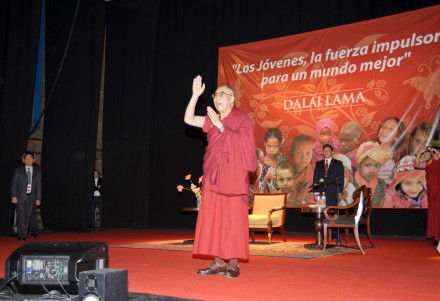Later when His Holiness arrived at Four Seasons Hotel, he was greeted by the members of the Dongyuling (Drukpa Kagyu) Buddhist Center, second host of the visit, and many well-wishers.
This morning (14 September), His Holiness had an hour long meeting with the Argentinean media. More than 25 media people, representing various media agencies attended the press meet. His Holiness told the media that he has come to Argentina at the invitation of many of his friends and his main purpose of the visit was to share his two commitments in life — to promote basic human values as a fellow human being and to promote harmony among various religious traditions, as a spiritual person and Buddhist.
His Holiness told the members of the media that they have an equal responsibility to promote and create awareness about these basic human values and that they should report unbiasedly, honestly and truthfully about social problems in order to benefit the larger society. He added that in many parts of the world, corruption has now become like a new form of cancer and that those who indulge in such unhealthy practice would not admit. Therefore, he said, it is the media role to investigate and report about these unhealthy practices truthfully and honestly to protect of the interest of a society.
Later His Holiness attended to various questions posed by media persons, ranging from how to incorporate Buddhist values in one’s life to how to adapt Buddhism to different culture settings to democratisation of the Tibetan community in exile. While answering the question on democratisation of the Tibetan community, His Holiness said that he noticed various flaws in the Tibetan government system when he was child and therefore he made serious attempts to reform the system as early as 1952. Later after coming into exile in 1959, he said, he gradually introduced a democratic system in the Tibetan community and then ultimately in 2002, the Tibetans managed to directly elect the chief executive leader (Kalon Tripa). For ten years since then the Tibetan people have shouldered more responsibility and also people became more politically matured and then he thought it was right time for him to completely devolve his administrative and political authorities to the elected leaders. Not only did he devolve the political authorities, His Holiness said, he proudly, happily and sincerely ended the temporal leadership of the 400 years old institution of the Dalai Lamas.
Towards the end of his press meet, His Holiness was joined by Argentinean Nobel Peace Laureate, Mr. Perez Esquivel. After the press meet, His Holiness had a private meeting with Mr Perez Ezquivel. Later, His Holiness had a lunch with Mr Perez Esquivel and his family members.
His Holiness also met Argentinean Congresswoman Dr Maria Laura Leguizamon and her family members.
In the afternoon, His Holiness depart for Coliseo Auditorium, where he delivered a lecture on ‘Transforming the Youth for a Better World’ for 2,000 people. Majority of audience turned out to be young people. In his lecture, His Holiness said that the 21st century belongs to youth, particularly those who are currently in the age group of 30s and lower. In order to make the 21st century more peaceful, more stable, more harmonious, His Holiness said that the responsibility falls on the young people. He warned that education alone might not bring inner peace and happiness and added that warm-heartedness and compassion are crucial to bring inner peace and happiness. In order to make a significant contribution to the development and progress of a society, he said, an individual youth should take more serious responsibility. He added that no one from outside was going to come to clean the society and therefore, one must take personal initiative in this direction. His Holiness answered questions posed by people through Internet as well as by others who were present in the auditorium.

